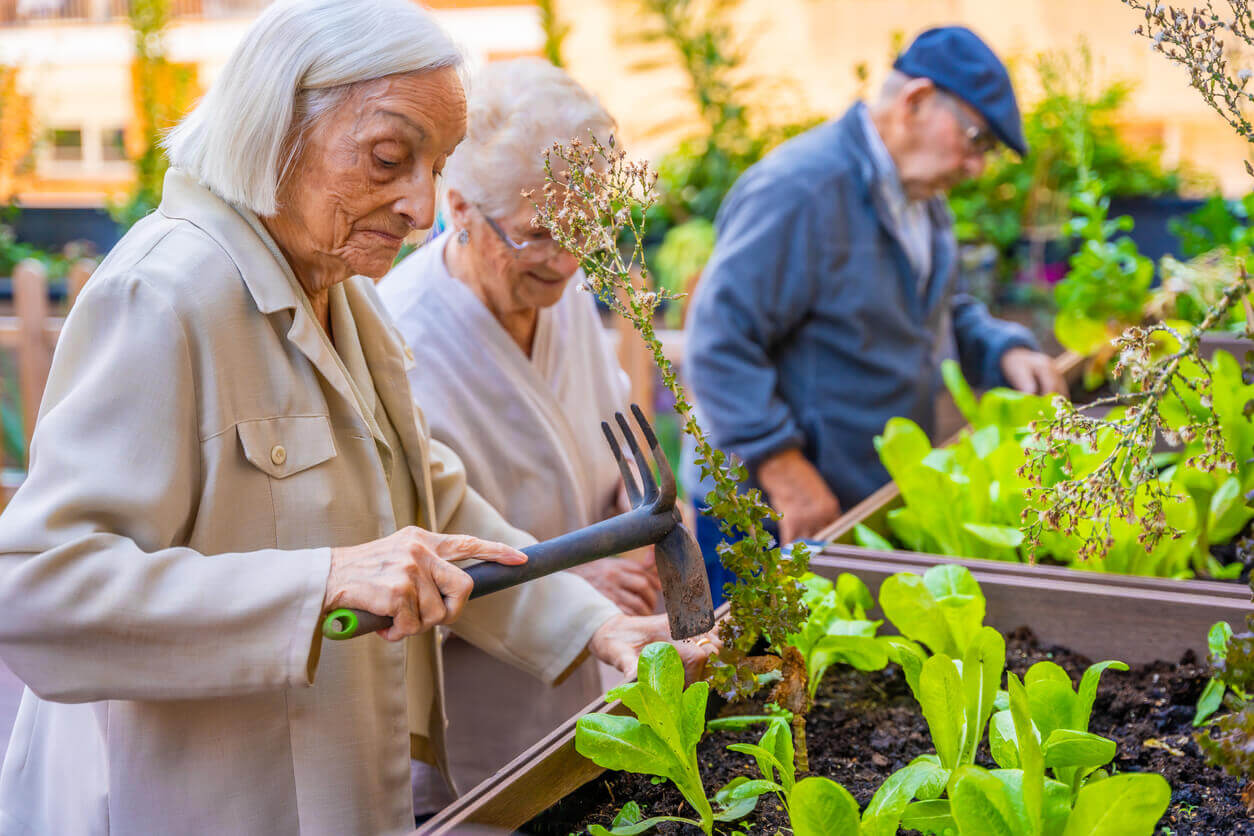Many adults choose to spend their golden years in a vibrant, supportive retirement community. However, these complexes offer more than just movie nights, Mahjong and social clubs. Residents also reap the benefits of community gardens, making gardening in retirement an increasingly popular activity.
Cultivating happiness: The joys of gardening in retirement
Food gardens promote mental and physical rewards for retirees, enriching their lives and fostering improved physicality, less stress, and a greater sense of purpose and achievement. Whether you’re an avid gardener or developing your green thumb, here are seven benefits of gardening for older adults in retirement communities.
1. Gentle Exercise
The World Health Organization recommends 150-300 minutes of moderate physical activity weekly or 75-150 minutes of vigorous exercise for adults over 65 and those with chronic conditions.
However, most older adults lead sedentary lifestyles, reducing their range of motion and muscle mass by 10%-40% and increasing their fall risk by 35%-40% after age 60.
Gardening movements — digging, lifting, watering and weeding — help you exercise gently, even if you have a disability. In turn, food gardens improve your mobility and muscle strength.
Discover 10 top tips for growing, harvesting, and enjoying fruits, vegetables, herbs and more from your home garden—when you access the FREEBIE How to Grow a Vegetable Garden, right now!
2. Access to Healthy Produce
Is there anything more enjoyable than picking fresh fruits and vegetables from your garden? A clean, nutritious food source is among the top benefits of gardening for older adults.
Proper nutrition supports the immune system and reduces your risk of developing chronic diseases. As you age, your body needs adequate nutrients to prevent high blood pressure, cardiovascular disease and diabetes. Gardening in retirement can help ensure you have access to these vital nutrients.
3. Socialization
Socializing with other retirees is a tenet of community gardens. You’ll find other people who enjoy getting their hands dirty and growing fresh produce as much as you do. Gardening also allows you to work with others to achieve a common goal.
Communicating with people is as mentally stimulating as gardening itself, keeping your mind active and engaged. New evidence suggests a 30%-50% reduced dementia risk when socialization is boosted later in life.
4. Learning Opportunities
Food gardens are an everlasting adventure, full of challenges, discoveries and outcomes for each crop you grow. You’ll always learn something new when you participate in a community garden, either from practice or fellow gardeners. These outdoor spaces deliver opportunities to experiment with different plants and growing techniques, broadening your horticulture knowledge.
5. Lower Carbon Footprint
Older people’s environmental views tend to vary. Although most are less likely to believe in and act on climate change, some are steadfast in decreasing their carbon footprint. If this is you, a community garden helps limit transportation emissions by reducing food miles and avoiding the need to visit the supermarket.
They also promote sustainable farming practices, including holistic fertilization and pest management approaches. Instead of synthetic fertilizers, residents may make nutrient-dense compost with leftover food. In turn, they’ll feel an overwhelming sense of purpose in contributing to a healthier planet.
6. Higher Vitamin D Levels
Vitamin D is crucial for preventing osteoporosis and bone fractures, especially since the body gradually loses over 50% between 20 and 80 years old. Just 15 minutes in the garden is all your skin needs to absorb adequate sunlight.
Remember to wear sunscreen to protect yourself from harmful ultraviolet rays. Although sunshine is beneficial for preventing vitamin D deficiencies, chronic, unprotected exposure could lead to skin cancer.
7. Aesthetic Appeal
One of the benefits of community gardens is their direct and indirect aesthetic appeal to older adults. Food gardens are always pleasing to look at, beautifying the retirement complex’s grounds and ultimately making residents happier.
Keeping a garden outside your retirement home in an independent living facility becomes a space you can enjoy privately. In other facilities, food gardens are nice areas to walk around and relax.
Bloom Where You’re Planted
Community gardens have much to offer retirees, encouraging healthy aging physically, mentally, and socially. Discover your interest and passion for growing your own food as you establish yourself in your retirement community. Embracing gardening in retirement can truly help you bloom where you’re planted.
We’d love to hear about your experiences with gardening in retirement! Share your stories, tips, or questions in the comments below.
